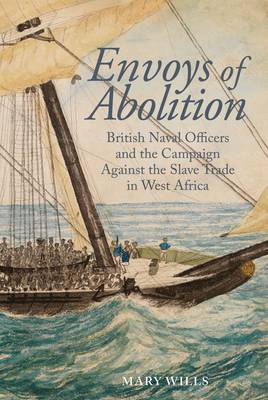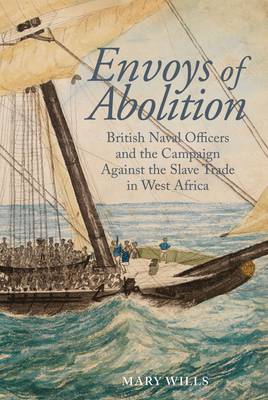
- Afhalen na 1 uur in een winkel met voorraad
- Gratis thuislevering in België vanaf € 30
- Ruim aanbod met 7 miljoen producten
- Afhalen na 1 uur in een winkel met voorraad
- Gratis thuislevering in België vanaf € 30
- Ruim aanbod met 7 miljoen producten
Zoeken
Envoys of Abolition
British Naval Officers and the Campaign Against the Slave Trade in West Africa
Mary Wills
€ 111,95
+ 223 punten
Uitvoering
Omschrijving
After Britain's Abolition of the Slave Trade Act of 1807, a squadron of Royal Navy vessels was sent to the West Coast of Africa tasked with suppressing the thriving transatlantic slave trade. Drawing on previously unpublished papers found in private collections and various archives in the UK and abroad, this book examines the personal and cultural experiences of the naval officers at the frontline of Britain's anti-slavery campaign in West Africa. It explores their unique roles in this 60-year operation: at sea, boarding slave ships bound for the Americas and 'liberating' captive Africans; on shore, as Britain resolved to 'improve' West African societies; and in the metropolitan debates around slavery and abolitionism in Britain. Their personal narratives are revealing of everyday concerns of health, rewards and strategy, to more profound questions of national honour, cultural encounters, responsibility for the lives of others in the most distressing of circumstances, and the true meaning of 'freedom' for formerly enslaved African peoples. British anti-slavery efforts and imperial agendas were tightly bound in the nineteenth century, inseparable from ideas of national identity. This is a book about individuals tasked with extraordinary service, military men who also worked as guardians, negotiators, and envoys of abolition.
Specificaties
Betrokkenen
- Auteur(s):
- Uitgeverij:
Inhoud
- Aantal bladzijden:
- 256
- Taal:
- Engels
- Reeks:
- Reeksnummer:
- nr. 15
Eigenschappen
- Productcode (EAN):
- 9781789620788
- Verschijningsdatum:
- 19/11/2019
- Uitvoering:
- Hardcover
- Formaat:
- Genaaid
- Afmetingen:
- 163 mm x 236 mm
- Gewicht:
- 544 g

Alleen bij Standaard Boekhandel
+ 223 punten op je klantenkaart van Standaard Boekhandel
Beoordelingen
We publiceren alleen reviews die voldoen aan de voorwaarden voor reviews. Bekijk onze voorwaarden voor reviews.











